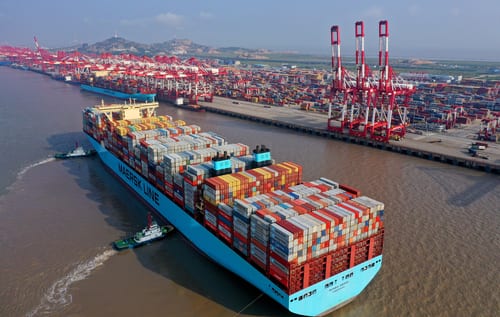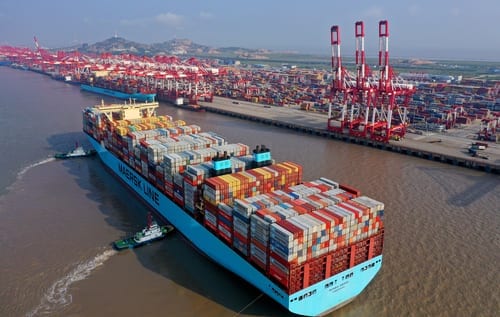Clogging the arteries of world trade.
Shipping companies that ship goods from China to the rest of the world claim to reduce the number of ocean-going vessels in order to stop the spread of demand for coronavirus crimping services and disrupt global supply chains.
According to the United Nations Conference on Trade and Development, around 80% of world trade in goods is carried out by sea and in China there are seven of the ten busiest container ports in the world. There is a mega port each near Singapore and South Korea.
“The closure of the global manufacturing center will affect container shipping as a whole as it is a critical factor in the intra-Asian and global supply chain,” said Peter Sand, chief shipping analyst at BIMCO, an international shipping association. “This will affect many industries and limit the demand for containerized freight transportation,” Sand told CNN Business.
Everything from cars and machines to clothing and other consumer goods is shipped in containers, and industrial disruption could go far beyond China as the country tries to contain the Coronavirus outbreak by shutting down factories and keeping workers at home ,
The longer the health crisis lasts, the more difficult it becomes to ship goods all over the world. The outbreak of the corona virus has killed more than 560 people and infected at least 28,000 – especially in China, where almost 60 million people live in cities affected by a blockage.
The car manufacturer Hyundai has already stopped production in its plants in South Korea because the supply of parts was interrupted due to the outbreak of the corona virus in China.
Floating quarantine
Due to the stoppages, some ships cannot enter Chinese ports as loading and unloading of goods becomes slower, said Guy Platten, secretary general of the International Chamber of Shipping, a trade organization. Others are stuck in the dock, waiting for workers to return to the harbors to complete construction and repairs, added Platten.
Even more ships are idle in “floating quarantine zones” as countries like Australia and Singapore refuse to enter ships that have entered Chinese ports until their occupation is virus-free, Sand added. Platten said he knew of at least one crew that had little to eat because their ship had been idle for so long.
Giant shipping companies such as Maersk, MSC Mediterranean Shipping, Hapag-Lloyd and CMA-CGM have announced that they have reduced the number of ships on the routes between China and Hong Kong with India, Canada, the United States and West Africa.
Shipowners say moving to unused Chinese factories after the end of the new lunar year has curtailed demand for ships and forced them to adjust their capacity during the Chinese off-season shipping season.
BIMCO members, which include 1,900 ship owners, operators, managers, brokers, and agents, report limited or no demand from Chinese buyers of marine goods such as coal, crude oil, and iron ore, Sand said. The lack of activity is reflected in oil prices that have plunged into a bear market.
Freightos, a logistics company, warned its customers about delays in delivering goods from China, and considered moving some shipments offshore or even getting goods from other countries where possible. The order backlog of deliveries, which usually takes place after the Lunar New Year, is deteriorating due to the current situation, which is driving sea freight prices up and exacerbating the delays, Freightos said.
Air freight disrupted
Not only is the shipment affected.
IAG Cargo, the parent carrier of British Airways IAG, canceled all flights to and from mainland China for at least the rest of the month on Monday. According to a statement on the UK government website, this is said to indicate travel.
German logistics group DHL reported “serious disruptions to incoming and outgoing air freight, truck and rail freight services”.
The closures could “have a significant impact on supply chain operations and industrial production” in China, in industries such as the automotive, pharmaceutical, medical, and high-tech manufacturing sectors, a report said.
DHL has suspended deliveries in the Hubei province, the epicenter of the virus, but said it does not make any further changes to how it works.
UPS and FedEx Express said they would continue to fly to China. UPS announced that demand for its services has decreased due to business closures.
– Daniela Sirtori-Cortina contributed to the reporting.



